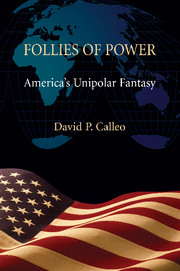2 - Hubris in the Middle East
Published online by Cambridge University Press: 05 June 2012
Summary
America's Liabilities
America's War on Terror, together with its unipolar assumptions, are all intimately linked to the Middle East. The region, with its variety of politically divided and undeveloped states, richly endowed with oil resources needed by the rest of the world, is an inviting venue for relieving hegemonic compulsions. It is not surprising that the most significant of America's recent wars have taken place there – two with Iraq and one with Afghanistan. Ironically, before going to war the United States gave important support to each, although in markedly different ways. Starting in the late 1970s, the U.S. upheld the Afghan resistance to a Soviet-backed government. Throughout most of the 1980s, the U.S. was a principal backer of Saddam Hussein's regime in its war with Iran. The collaboration was rudely broken in 1990, when Saddam, finally at peace with Iran, seized the neighboring oil state of Kuwait. Whatever the merits of the historic case for attaching Kuwait to Iraq, the invasion was a direct challenge to the widely supported principle that borders should not be changed by force, as well as to long-standing Anglo-American oil interests. The administration of the elder George Bush intervened massively but only after carefully garnering the support of the European allies and most of Iraq's regional neighbors while eliciting the forbearance of the Soviet Union.
Arguably, the intervention in Iraq might not have occurred had the Cold War not been ending. In any event, something of the Cold War's habits of self-restraint persisted.
- Type
- Chapter
- Information
- Follies of PowerAmerica's Unipolar Fantasy, pp. 22 - 38Publisher: Cambridge University PressPrint publication year: 2009



